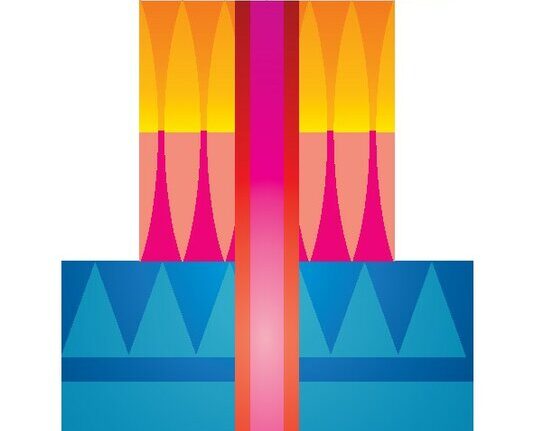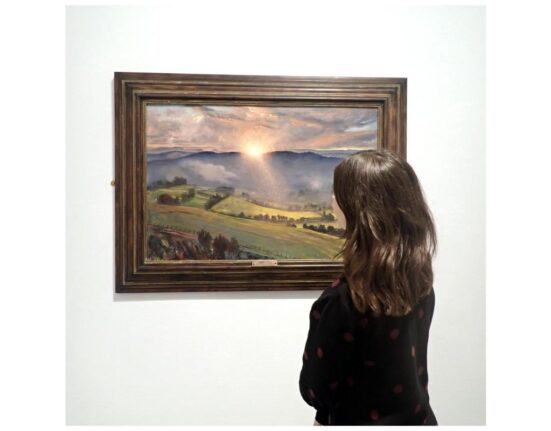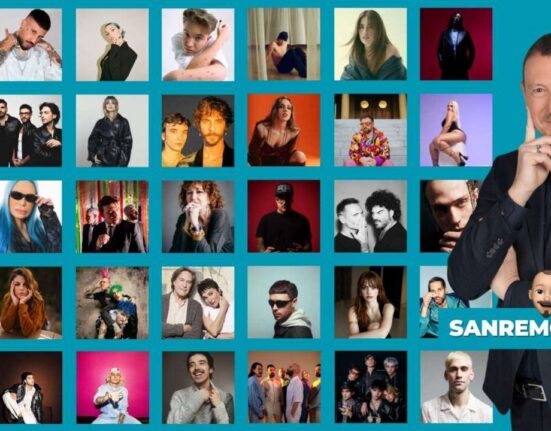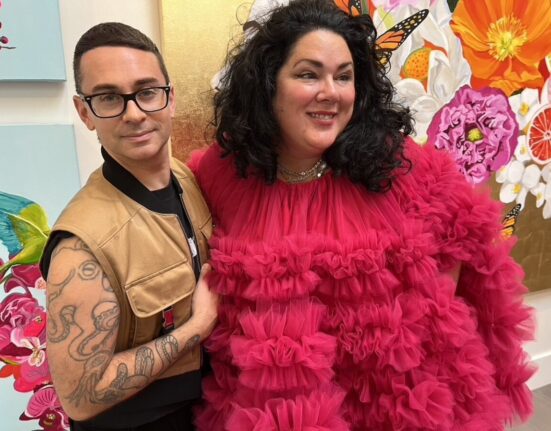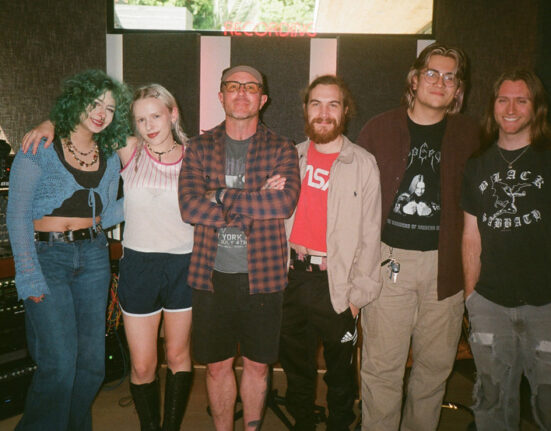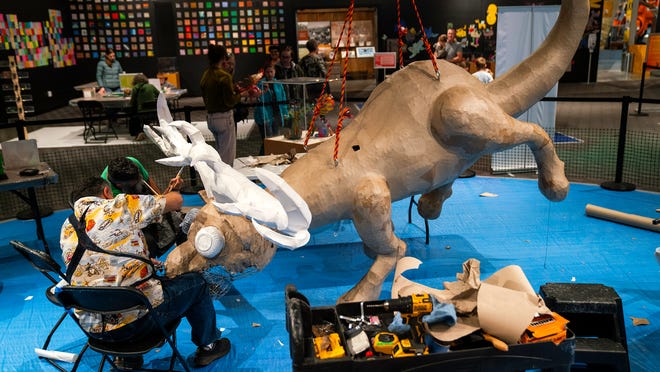
The prototype is brilliant. A blue, yellow and red black-footed ferret with black polka dots on its pink antlers and unicorn-like wings in the multiple bright colors of a butterfly.
The finished sculpture promises to be far more spectacular at 10 feet long from antlers to tail and 3 feet wide in the torso, extending to 7 feet across the antlers. The wings, which have not yet been added, will extend 6 feet from the body, according to measurements provided by the Fort Collins Museum of Discovery, the project’s sponsor. The antlers and eyes will be illuminated when complete.
It’s an alebrije, a fantasy creature, Mexican artists Ruben Mica and Oscar Becerra Mora explained Friday, that was inspired by their visit to Fort Collins in December. The black-footed ferret, they learned, was one of two mascots used by the Fort Collins Museum of Discovery, where they are completing a monthlong residency through April 4 as part of a community-driven exhibition titled: “Alebrijes: Mystical Beings, Fantastical Creatures.”
So, they chose the black-footed ferret as the base for their giant alebrije that will hang from the ceiling of the museum in a long-term display when it is completed.

The artists are working onsite in the museum’s Woodward Special Exhibition Gallery from 9 a.m. to 5 p.m. most Tuesdays through Sundays, museum officials said. Community members are invited to watch and interact with Mica and Becerra as they create their alebrije. A free community celebration of the project is planned upon its completion, from 5-7 p.m. Thursday, April 4.
“This is such a unique experience for the museum to co-create with the entire community,” said Laura Valdez, the museum’s co-executive director, in a news release. “To have international artists at this level dedicate this amount of time and care in sharing their craft and creativity is a rare opportunity. They’re energized by the community’s excitement and participation.”
Alebrijes originated in Mexico City, where Mica and Becerra both live, in the 1940s by artist Pedro Linares, according to a 2009 article in the Mexican edition of TeRra Magazine. Linares is said to have created them from creatures he saw while ill in his feverish dreams. They’re made of cartoneria, a Mexican form of paper-mache.
“What characterizes alebrijes is that they come from a place of fantasy,” Becerra said through Aly Eden, an interpreter brought in by the museum at specific times during the final two weeks of their work to help the artists communicate with patrons and the media. “In all cultures you see that there is fantasy, there’s some sort of mythology. Humans tend to be very drawn to fantasy, and it, in turn, becomes a sort of universal language. Even though we don’t speak English fluently, the fantasy itself becomes the universal language.”
More:18 exhibits, performances and arts happenings to look forward to in Fort Collins this year
The bright colors, typical of other forms of Mexican art, are not chosen specifically ahead of time but are “driven by your feelings,” Mica said through Eden. “It’s not like, ‘Oh, I’m going to put this here; I’m going to put that there,’ but rather you just let yourself flow with the process and put a lot of color on that.”

Mica, 57, has worked in various forms of art since he was 18 or 19 years old. Becerra, 45, is a self-taught cartoneria artist. The two men have been creating alebrijes together for the past 10 years and often travel and exhibit their work.
This project, though, is their biggest yet, both in the size of the alejibre and the amount of time they’ve had to work on it. Their work usually involves creating skulls and altar pieces for Day of the Dead celebrations and other events.
The smaller alebrije they created as a prototype for the larger sculpture is basically cardboard and paper, held together with paste. They brought their own paint and glue with them from Mexico because they weren’t sure they could find what they needed locally, Mica said.
The large sculpture requires a metallic structure, built from aluminum that they also brought with them, and welded in places to provide the support necessary for the lighting inside and for the finished project to be safely hung from the museum’s ceiling.

“In this case, we’re combining the traditional cartoneria technique with an illumination technique that’s more modern, just to give the piece a more spectacular look,” Becerra said.
“It’s a long process. So of course, you begin with picking the animal. Then you have to make some decisions about which elements you’re going to add to it, and then whenever it’s a large piece, there’s always a bit of problem-solving that you have to do when it comes to the structure.”
The two artists visited for a week in December, conducting bilingual workshops and visiting three Fort Collins elementary schools — Harris, Laurel and Linton. Artwork students created during those visits hang along with alebrijes on loan from personal collections, bringing bright colors to the black walls of the Woodward Special Exhibition Gallery. There are also colorings and bas-relief sculptures on cardboard squares that visitors are creating now at various stations in the gallery while Mica and Becerra complete their alebrije in the middle of the room. The artists take breaks to chat with museum visitors and to admire the artwork being created around them, including hundreds of brightly painted bas-relief sculptures.
Brice Giltner’s 6-year-old son was completing a bas-relief sculpture Friday morning while visiting the museum with his parents and 8-year-old sister.
“They’re pretty creative at home, but this is something different for them that maybe we wouldn’t be able to provide,” Brice Giltner said. “It’s just a different look at art, and to see big sculptures is pretty fun for them.”
Reporter Kelly Lyell covers education, breaking news, some sports and other topics of interest for the Coloradoan. Contact him at kellylyell@coloradoan.com,x.com/KellyLyell and facebook.com/KellyLyell.news.

